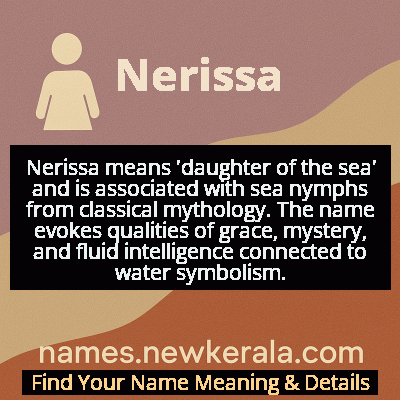Nerissa Name Meaning & Details
Origin, Popularity, Numerology Analysis & Name Meaning of Nerissa
Discover the origin, meaning, and cultural significance of the name NERISSA. Delve into its historical roots and explore the lasting impact it has had on communities and traditions.
Name
Nerissa
Gender
Female
Origin
Latin
Lucky Number
4
Meaning of the Name - Nerissa
Nerissa means 'daughter of the sea' and is associated with sea nymphs from classical mythology. The name evokes qualities of grace, mystery, and fluid intelligence connected to water symbolism.
Nerissa - Complete Numerology Analysis
Your Numerology Number
Based on Pythagorean Numerology System
Ruling Planet
Uranus (Rahu)
Positive Nature
Strong sense of order, loyal, practical, and disciplined.
Negative Traits
Stubborn, overly serious, rigid, and prone to feeling restricted.
Lucky Colours
Blue, gray.
Lucky Days
Saturday.
Lucky Stones
Blue sapphire.
Harmony Numbers
1, 7, 8.
Best Suited Professions
Managers, engineers, accountants, organizers.
What People Like About You
Dependability, discipline, practicality.
Famous People Named Nerissa
Nerissa
Fictional Character
Portia's clever waiting-gentlewoman in Shakespeare's 'The Merchant of Venice'
Nerissa S. Archer
Educator and Activist
Pioneering African-American educator and women's rights advocate
Nerissa Cargill Thompson
Artist and Curator
British visual artist known for mixed-media works exploring identity and heritage
Nerissa Bowes-Lyon
Aristocrat
Member of British royal family, cousin to Queen Elizabeth II
Name Variations & International Equivalents
Click on blue names to explore their detailed meanings. Gray names with will be available soon.
Cultural & Historical Significance
In Renaissance literature, the name carried connotations of wisdom, loyalty, and cleverness, reflecting the character's role in Shakespeare's play. The mythological connection to sea nymphs imbued the name with qualities of fluidity, mystery, and natural grace. Throughout the 18th and 19th centuries, the name maintained a presence in English-speaking countries, often chosen by educated families familiar with classical literature and mythology. The name's association with water and the sea has made it particularly meaningful in coastal communities and among those with maritime traditions.
Extended Personality Analysis
Individuals named Nerissa are often perceived as possessing a deep, intuitive nature combined with intellectual sharpness. They tend to be highly adaptable and fluid in their thinking, much like the sea from which their name derives. Nerissas are typically known for their emotional depth and sensitivity, often displaying strong empathy and understanding toward others. Their mythological connection to sea nymphs suggests a personality that is both mysterious and alluring, with an innate grace that draws people to them. They often possess a quiet confidence and inner strength that emerges when faced with challenges.
Common traits include excellent communication skills, wit, and loyalty to those they care about. Like Shakespeare's character, modern Nerissas often demonstrate clever problem-solving abilities and a pragmatic approach to difficult situations. They tend to be creative thinkers with a strong sense of justice and fairness. Their connection to water symbolism often manifests as emotional intelligence and the ability to navigate complex social situations with ease. While they can be reserved initially, once trust is established, they prove to be deeply committed friends and partners who bring wisdom and perspective to relationships.
Modern Usage & Popularity
In contemporary times, Nerissa remains an uncommon but distinctive choice for baby girls. The name has never reached the popularity charts in most English-speaking countries, maintaining its status as a rare and elegant selection. It enjoys particular favor among parents with literary interests or those seeking mythological names that are recognizable but not overused. Recent years have seen a slight increase in usage as parents search for unique classical names that stand out from more common choices. The name is most popular in the United States, United Kingdom, and Australia, often chosen by educated, middle-class families who appreciate its Shakespearean heritage and mythological roots. Its rarity ensures that bearers of the name are likely to be the only Nerissa in their social circles, adding to its appeal for parents seeking distinctive names.
Symbolic & Spiritual Meanings
Nerissa carries profound symbolic meanings rooted in its aquatic origins and literary heritage. As 'daughter of the sea,' the name symbolizes fluidity, depth, and the ever-changing nature of emotions and life itself. Water symbolism connects Nerissa to intuition, dreams, and the subconscious mind, suggesting a personality that can navigate emotional depths with grace. The sea connection also represents freedom, mystery, and the unknown, much like the ocean's unexplored depths. In mythological terms, the name embodies protection and guidance, as the original Nereids were guardians of sailors. Shakespeare's addition of the name to literature added layers of intelligence, loyalty, and practical wisdom to its symbolism. The name suggests someone who can adapt to changing circumstances while maintaining core integrity, much like water taking the shape of its container while remaining fundamentally unchanged.

